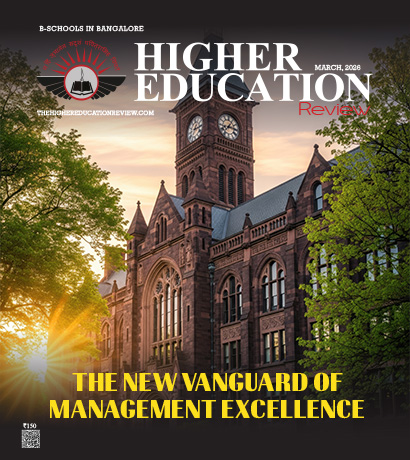Why MBA Graduates Embrace Global Perspectives for Career Growth

In today's rapidly changing corporate environment, an MBA is no longer solely about becoming an expert in strategy, finance, or leadership. It involves comprehending the ways in which these components interact in a world that is becoming more interconnected by the day. MBA graduates are more aware than ever that traditional business programs might not adequately equip them with the necessary skills for an international career. People today have begun to embrace a global perspective as a vital tool for leadership effectiveness, market adaptability, and career advancement.
The Shift toward Global Competence
Business education used to be frequently localized, emphasizing domestic markets and conventional corporate frameworks. However, with globalization and organizations expanding their global footprint, graduates must adapt skills for cross-border challenges. Firms seek leaders who can handle expanding markets, cultural quirks, and complicated international trade regulations. More than 60% of worldwide companies give preference to applicants who have international experience or an awareness of global markets, per a poll conducted by the Graduate Management Admission Council (GMAC). This change emphasizes how crucial global literacy is to business education.
Today’s graduates are expected to understand not just how businesses function but also how to tailor solutions relative to economic policies, regulatory frameworks, and consumer behaviors across different regions. Business success is no longer determined in isolation but is influenced by factors such as global supply chain efficiency, trade relations, and geopolitical stability. Managers need to demonstrate agility and focus in their strategic decision-making thereby ensuring organizations are effectively achieving their strategic priorities.
Why Global Perspectives Matter
Navigating an Interconnected Economy
Global trends are having an increasing impact on consumer behavior, financial markets, and supply networks. Disruptions in one region of the world can have significant repercussions in other regions, as the COVID-19 pandemic showed. Globally minded MBA graduates can evaluate risks, spot opportunities, and put plans into action that take into consideration global factors.
Cultural Intelligence as a Leadership Asset
Collaboration across cultural boundaries is a feature of contemporary business. Cultural intelligence is a crucial ability for managing multinational teams, negotiating with foreign partners, and selling goods to a variety of consumers. Students who pursue an MBA with a global focus gain empathy, flexibility, and a sophisticated grasp of various business conventions. A marketing strategy that is successful in the United States may not necessarily be replicated In Brazil or Japan. Differences in consumer behavior, communication styles, and regulatory requirements necessitate a more customized approach.
Competitive Advantage in Career Growth
Employees who can collaborate across borders are becoming increasingly valued by businesses. Employers can tell if a candidate can succeed in dynamic, multicultural environments by looking at their global experience, whether it comes from study abroad programs, international internships, or case studies. International organizations, consulting firms, and multinational corporations frequently hire graduates of programs that prioritize global immersion. They stand out for their capacity to view issues holistically and see beyond the limitations of the local market.
The Role of Global MBA Programs
Leading business schools are incorporating international exposure into their programs in a variety of ways. Some of these are:
-
Global Exchange Programs: Renowned business schools have established strategic alliances with institutions worldwide, providing students with the opportunity to study in several different locations. Through these exchange programs, MBA students can see various business environments and gain firsthand knowledge of how cultural differences in corporate structures, consumer behavior, and economic policies exist.
-
International Consulting Projects: Beyond theoretical instruction, several MBA programs include consulting projects where students collaborate with governments, corporations, and non-governmental organizations to address urgent global issues. These experiences bridge the gap between academia and industry, allowing students to apply their skills in real-world settings while understanding the complexities of international markets.
- Multi-City Learning Models: Multi-city learning models have been incorporated into some of the most cutting-edge MBA programs, allowing students to complete their coursework in several global business centers. Unmatched exposure to a variety of economies, sectors, and leadership philosophies is provided by these programs. Students who participate in this rigorous global learning program gain a broad range of flexible skills that will enable them to take on leadership roles in fast-paced, multinational corporations.
Looking Ahead: The Future of Global Business Leadership
As companies continue to grow internationally, the business leaders of tomorrow need to have a strong global perspective. Success in the upcoming decades will depend on one's capacity to lead diverse teams, handle geopolitical complications, and evaluate global trends. Globalization has accelerated due to digital change, which makes it even more important for recent MBA graduates to keep up with new environmental and dynamic trends. Worldwide e-commerce platforms, remote work, and virtual collaboration technologies have made it simpler for companies to conduct business internationally, emphasizing the need for executives who have a thorough awareness of worldwide markets. The business world no longer operates in silos, and neither should business education. like the real world does. MBA graduates who possess a global mindset are more likely to succeed in the linked global economy of today. They can obtain a competitive edge in their employment by developing cultural intelligence, traveling abroad, and comprehending the complexities of international marketplaces. The future of business leadership will continue to be significantly shaped by MBA graduates as more business schools incorporate global viewpoints into their curricula. The next generation of great business executives will be characterized by their capacity for cross-border leadership, strategic action, and global thinking.

